USB-C power adapters are essential for fast charging, offering various wattage options to accommodate a wide range of devices, from smartphones to laptops. By selecting adapters that comply with USB Power Delivery (USB PD) standards, users can ensure compatibility and optimal charging speeds for their devices.
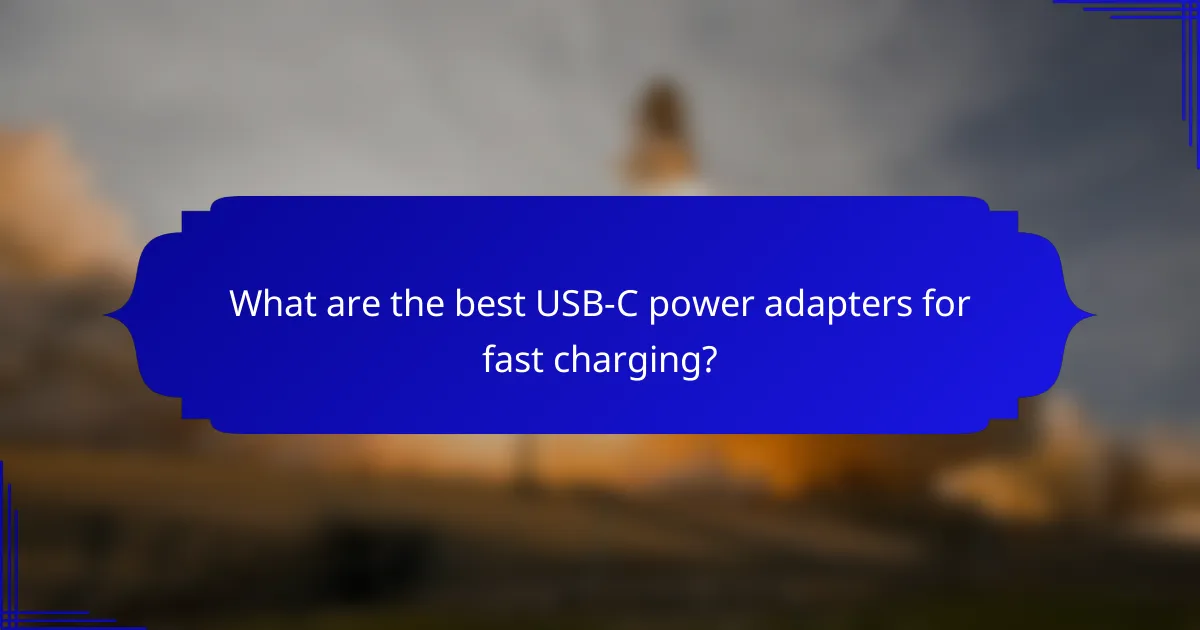
What are the best USB-C power adapters for fast charging?
The best USB-C power adapters for fast charging typically offer a range of wattage options to support various devices, from smartphones to laptops. Look for adapters that comply with USB Power Delivery (USB PD) standards to ensure compatibility and efficient charging speeds.
Anker PowerPort III Nano 20W
The Anker PowerPort III Nano 20W is a compact charger ideal for smartphones and smaller devices. It delivers fast charging capabilities, allowing you to charge an iPhone to about 50% in around 30 minutes.
This adapter is lightweight and portable, making it a great choice for travel. Ensure you use a compatible USB-C cable to maximize charging efficiency.
Apple 20W USB-C Power Adapter
The Apple 20W USB-C Power Adapter is designed to work seamlessly with Apple devices, providing optimal charging speeds for iPhones and iPads. It can charge an iPhone to about 50% in approximately 30 minutes, similar to other 20W options.
This adapter is compact and easy to carry, making it suitable for everyday use. It is recommended to pair it with an Apple-certified USB-C cable for best results.
RAVPower 61W USB-C Charger
The RAVPower 61W USB-C Charger is versatile and powerful, capable of charging laptops, tablets, and smartphones. With USB Power Delivery, it can charge a MacBook Pro at full speed, making it a great option for professionals on the go.
This charger features multiple ports, allowing you to charge multiple devices simultaneously. It’s important to check the wattage requirements of your devices to ensure efficient charging.
Samsung 25W USB-C Fast Charger
The Samsung 25W USB-C Fast Charger is optimized for Samsung devices, providing rapid charging for Galaxy smartphones and tablets. It can charge a Galaxy S21 to about 50% in around 30 minutes.
This charger is compatible with other USB-C devices as well, but for best results, use it with Samsung’s fast charging technology. Always use a quality USB-C cable to ensure safety and efficiency.
UGREEN 65W USB-C Charger
The UGREEN 65W USB-C Charger is a powerful option suitable for charging laptops, tablets, and smartphones. It supports USB Power Delivery and can charge devices like the MacBook Air quickly and efficiently.
This charger includes multiple ports, allowing for simultaneous charging of different devices. Be mindful of the total wattage output when charging multiple devices to avoid slow charging speeds.
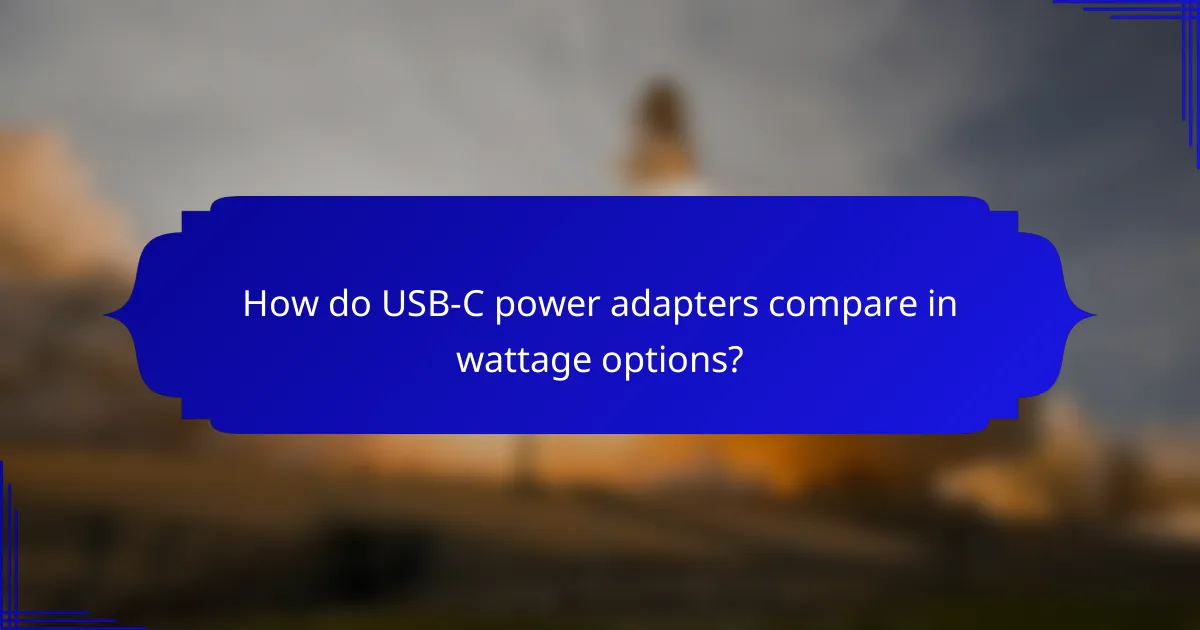
How do USB-C power adapters compare in wattage options?
USB-C power adapters come in various wattage options, which directly affect their charging speeds and compatibility with different devices. Understanding these wattage levels helps you choose the right adapter for your needs, ensuring efficient charging for smartphones, tablets, laptops, and high-performance devices.
20W for smartphones
A 20W USB-C power adapter is typically sufficient for charging most smartphones quickly. This wattage allows for fast charging capabilities, enabling devices to reach around 50% battery in approximately 30 minutes, depending on the model. Many modern smartphones support this wattage, making it a popular choice for everyday use.
30W for tablets
Tablets often require more power than smartphones, and a 30W USB-C power adapter is a suitable option for many models. This wattage can charge a tablet to about 50% in around 45 minutes, providing a balance between speed and efficiency. When selecting an adapter, ensure that it meets the power requirements of your specific tablet model for optimal performance.
61W for laptops
A 61W USB-C power adapter is commonly used for charging mid-range laptops, particularly those from brands like Apple and Dell. This wattage allows for faster charging, typically reaching about 50% in an hour. When using a 61W adapter, check your laptop’s specifications to confirm compatibility, as some high-performance laptops may require more power.
100W for high-performance devices
For high-performance devices, such as gaming laptops or workstations, a 100W USB-C power adapter is essential. This wattage supports rapid charging and can power demanding applications without draining the battery. When choosing a 100W adapter, ensure it complies with USB Power Delivery standards to maximize efficiency and safety.
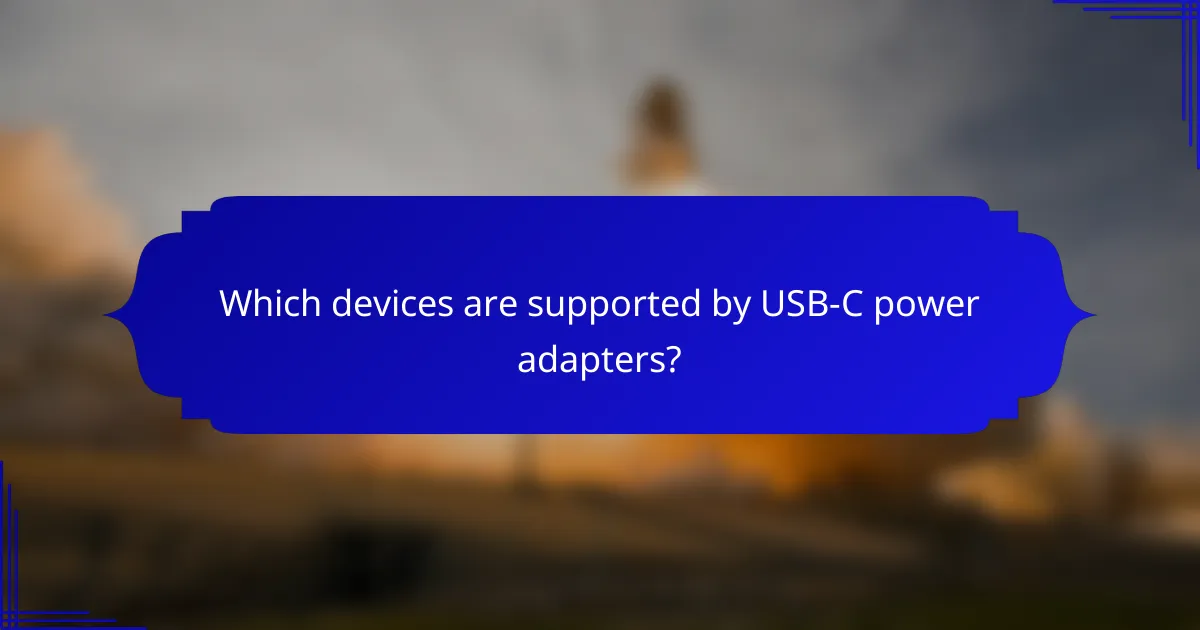
Which devices are supported by USB-C power adapters?
USB-C power adapters are compatible with a wide range of devices, including smartphones, laptops, tablets, and accessories. This universal standard allows for efficient charging across various brands and models, making it a versatile choice for users.
Smartphones like iPhone and Samsung Galaxy
Many modern smartphones, including the latest iPhone models and Samsung Galaxy devices, support USB-C power adapters. These smartphones typically charge at speeds ranging from 18W to 30W, allowing for quick power-ups even in short timeframes.
When using a USB-C power adapter, ensure that it meets the required wattage for your specific smartphone model to achieve optimal charging speeds. For instance, using a higher wattage adapter won’t harm the device, as smartphones will only draw the power they need.
Laptops including MacBook and Dell XPS
USB-C power adapters are increasingly common for laptops, such as the MacBook and Dell XPS series. These devices often require higher wattage, typically between 30W and 100W, depending on the model and usage.
When selecting a USB-C power adapter for a laptop, it’s crucial to match the wattage specifications recommended by the manufacturer. Using an underpowered adapter may lead to slower charging or even battery drain during use.
Tablets such as iPad Pro
Tablets like the iPad Pro also utilize USB-C power adapters for charging. These devices generally support charging speeds around 18W to 30W, similar to many smartphones.
For optimal performance, consider using a USB-C power adapter that matches or exceeds the wattage specified by the tablet manufacturer. This ensures faster charging and better overall efficiency.
Accessories like Nintendo Switch
Accessories such as the Nintendo Switch are compatible with USB-C power adapters, allowing for convenient charging while gaming. The Switch typically requires a 15W to 30W adapter for efficient charging.
Using a USB-C power adapter with the appropriate wattage can significantly reduce charging times, enabling users to get back to their games more quickly. Always check the specifications to ensure compatibility and optimal performance.
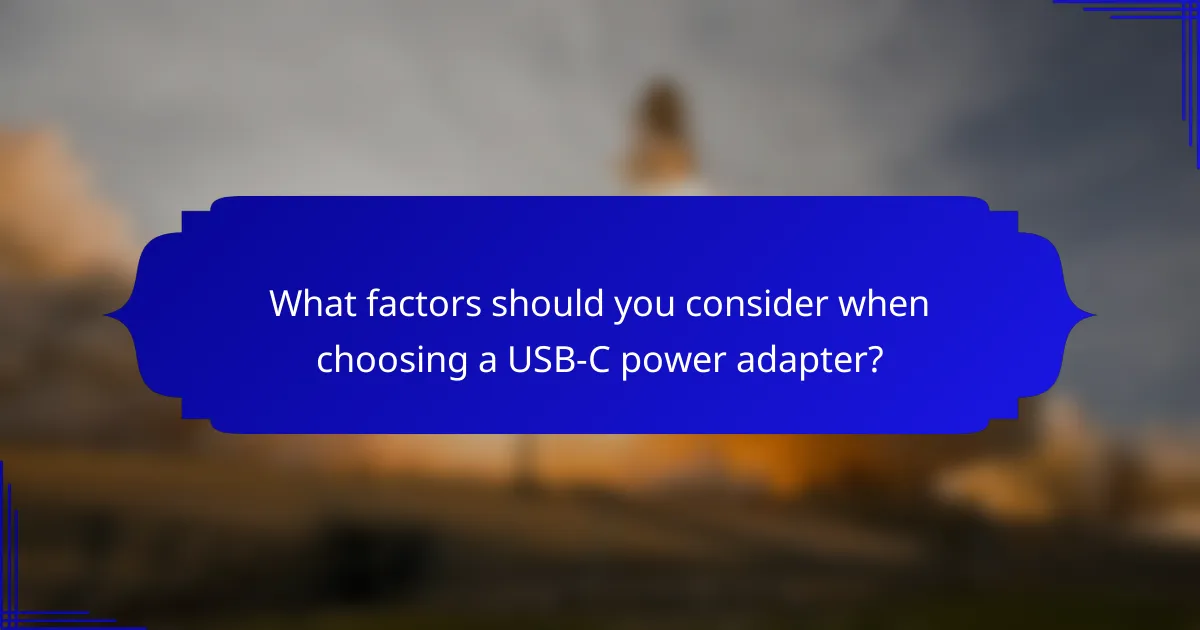
What factors should you consider when choosing a USB-C power adapter?
When selecting a USB-C power adapter, consider wattage compatibility, brand reliability, and portability. These factors will ensure that the adapter meets your charging needs and works effectively with your devices.
Wattage compatibility
Wattage compatibility is crucial because different devices require different power levels for optimal charging. For instance, smartphones typically need around 18-30 watts, while laptops may require 45 watts or more. Using an adapter with insufficient wattage can lead to slow charging or even failure to charge.
Check the specifications of your devices to determine the required wattage. Many adapters are labeled with their output, making it easier to match them with your devices. It’s often safe to use a higher wattage adapter, as devices will only draw the power they need.
Brand reliability
Choosing a reliable brand can significantly impact the performance and safety of your USB-C power adapter. Established brands often adhere to safety standards and provide better customer support. Look for brands that offer warranties or guarantees, which can be a sign of quality.
Research user reviews and ratings to gauge the reliability of different brands. Avoid off-brand or unverified products, as they may lack essential safety features and could potentially damage your devices.
Portability and size
Portability and size are important if you plan to travel with your USB-C power adapter. Compact and lightweight adapters are easier to carry, especially when you have multiple devices to charge. Consider adapters that come with foldable plugs or are designed for travel to save space in your bag.
However, be mindful that smaller adapters may have lower wattage output. Balance your need for portability with the charging requirements of your devices to ensure you have an efficient solution on the go.
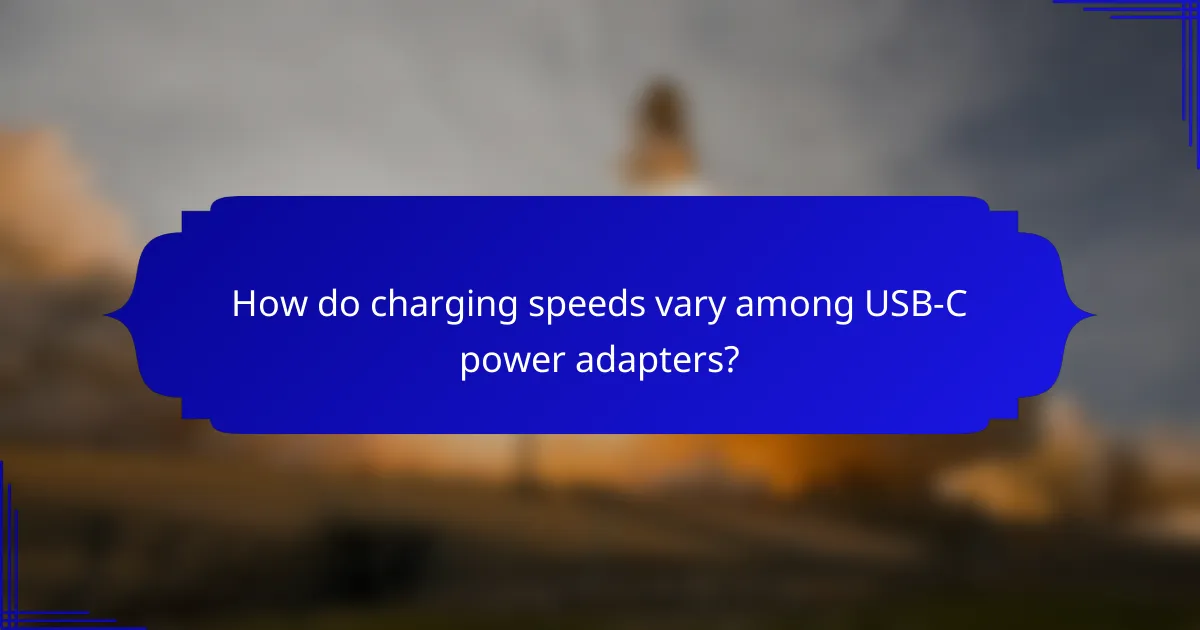
How do charging speeds vary among USB-C power adapters?
Charging speeds for USB-C power adapters can differ significantly based on several factors, including the adapter’s wattage, the device being charged, and the charging technology used. Understanding these variations helps users select the right adapter for their needs.
Fast charging vs. standard charging
Fast charging allows devices to charge at a higher rate, significantly reducing the time needed to reach full battery capacity. Standard charging, on the other hand, typically delivers lower power, resulting in longer charging times.
For example, a fast charger may provide up to 100 watts, enabling devices like laptops to charge in under two hours, while standard chargers often operate at 5 to 20 watts, taking several hours for the same devices.
Power Delivery (PD) technology
Power Delivery (PD) is a charging standard that enables higher power levels and faster charging speeds through USB-C connections. PD technology allows devices to negotiate the optimal power level, which can range from 5 watts to 100 watts or more, depending on the device’s requirements.
This means that a PD-enabled charger can efficiently charge everything from smartphones to laptops, adjusting the power output as needed. Users should ensure both their charger and device support PD for the best performance.
Voltage and amperage ratings
The voltage and amperage ratings of a USB-C power adapter are crucial for determining its charging speed. Voltage is measured in volts (V), while amperage is measured in amperes (A); together, they determine the wattage (W) of the charger, calculated as volts multiplied by amperes.
For instance, a charger rated at 20V and 3A delivers 60W of power. Users should match their device’s requirements with the adapter’s ratings to avoid underperformance or potential damage.
